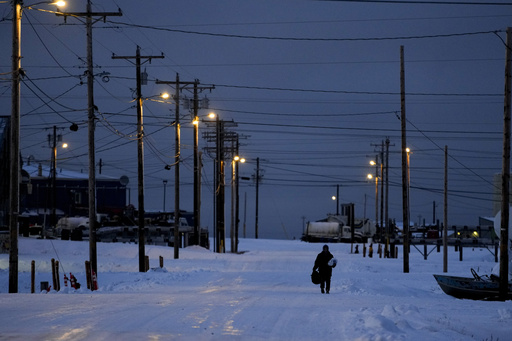
KAKTOVIK, Alaska — Last summer, George Kaleak, a whaling captain from the small Alaska Native village of Kaktovik, posted a notice on the community center’s bulletin board. The flyer requested a chairperson for the elections scheduled for August and November, urging interested residents to contact the Nome Elections office in Alaska. Despite his efforts, Kaleak reported that no one expressed interest, and the state did not provide an elections supervisor or poll workers for the village.
As the primary election date, August 20, approached, Kaktovik’s polling station did not open, leaving the village’s 189 registered voters without a place to cast their ballots. Kaleak, who also serves as an adviser to the regional government, indicated he did not bother to try to vote due to the apparent lack of support. “I knew there was nobody to open it,” he stated in a recent interview.
For many voters in Kaktovik, this situation may be shocking, but for the residents, life proceeded as usual. While some residents expressed their frustrations, their attention quickly shifted to the onset of whaling season, which took precedence over electoral concerns.
In more than 200 remote Native villages scattered across Alaska, voting challenges remain an ongoing issue. Many of these isolated locations lack easy road access and can only be reached by small planes. Additionally, harsh weather can disrupt mail services for extended periods. In Wales, another remote village, polling sites remained closed for the August primary, while in Anaktuvuk Pass, voters encountered delays, with the polling station opening for just 30 minutes before closing.
With the upcoming general election on November 5, the stakes are high for Alaska’s only congressional seat. Democratic Rep. Mary Peltola, the first Alaska Native to serve in Congress, is engaged in a close reelection battle against Republican Nick Begich, and due to the tight margin, it is expected that this seat could be decided by just a few votes.
State and local officials are working diligently to ensure that the elections are operated smoothly this November. Carol Beecher, director of the Alaska Division of Elections, reaffirmed the commitment to staffing every precinct and ensuring timely openings. However, she acknowledged the challenges of finding temporary workers to run elections in these remote regions of Alaska.
Alaska Native voters have also faced language barriers at polling places, and past elections have revealed significant issues with absentee ballot distribution and acceptance. For instance, a failure in 2020 to send timely absentee ballots to the village of Mertarvik occurred simply because election officials were unaware that residents were living there. Furthermore, in 2022, high disqualification rates for ballots in lower-income areas highlighted serious flaws in the election process, particularly for those who struggle with witness signature requirements on ballots.
Kaktovik itself is situated 670 miles north of Anchorage, nestled between the Arctic Ocean and Alaska’s North Slope. This village relies on air travel year-round, with supplies only arriving via ocean-going barges in the summer. Kaktovik’s 270 residents, primarily of the Inupiat tribe, depend on hunting for their sustenance. The community, famous for its polar bear tourism, has developed a patrol system to manage interactions between bears and residents.
During the primary election, many residents were engaged in hunting or fishing activities, and complications arose concerning election staffing. Madeline Gordon, who was previously an election worker, took a job at a local grocery store and informed the state that she could not oversee the primary elections. Despite this, ballots were mailed to her home, and when a city clerk attempted to intervene, she learned that the ballots were to be kept until further notice, which did not occur as scheduled.
As the primary election drew closer, Kaleak’s attempts to recruit election workers at the community center yielded no interest, largely due to the requirement of travel for training and the low hourly pay of $20.50, which was not enticing given the high local cost of living.
In response to the failure to open precincts in Kaktovik for the August primary, local officials are taking proactive measures to prevent a repeat scenario in November. Borough officials have made arrangements to ensure someone will be present at the polling station this time, regardless of the state’s involvement.
The borough is also coordinating with election officials to staff polling locations in other villages, such as Nuiqsut and Anaktuvuk Pass. Officials have voiced their discontent over the previous lack of preparation and communication that led to unstaffed sites.
Upon his return from vacation, Mayor Nathan Gordon Jr. felt the frustrations of residents firsthand regarding the closed polling place. There are ongoing discussions within the local government to formally train individuals to run elections, to ensure that Kaktovik’s voters are never disenfranchised in this manner again.
Kaleak emphasized that the disenfranchisement of Alaska Native voters merits the same attention and outrage as similar incidents in other regions of the country, asserting, “Every person should be able to have a vote, and it should count, and it should be fair.”
